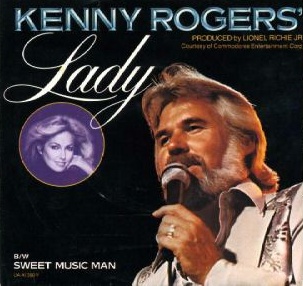Related Research Articles

"Three Times a Lady" is a 1978 song by American soul group Commodores for their album Natural High, written by lead singer Lionel Richie. It was produced by James Anthony Carmichael and Commodores.

"Poison" is the debut single of American vocal group Bell Biv DeVoe, released as the first single from their debut album of the same name. The song, in the style of new jack swing, a late-1980s/early-1990s hybrid of R&B, hip hop and swing, was the group's most successful.

"You'll Never Find Another Love Like Mine" is a song written by Kenny Gamble and Leon Huff and performed by R&B singer Lou Rawls on his 1976 album All Things in Time. The song proved to be Rawls' breakthrough hit, reaching number 1 on both the R&B and Easy Listening charts as well as number 4 on the dance chart and number 2 on the US Billboard Hot 100. This was the first and only time that one of Rawls' records reached Billboard's pop Top Ten.

"When a Man Loves a Woman" is a song written by Calvin Lewis and Andrew Wright and first recorded by Percy Sledge in 1966 at Norala Sound Studio in Sheffield, Alabama. It made number one on both the Billboard Hot 100 and R&B singles charts. Country singer John Wesley Ryles had a minor hit with his version of the song in 1976. Singer and actress Bette Midler recorded the song and had a Top 40 hit with her version in 1980. In 1991, Michael Bolton recorded the song and his version peaked at number one on both the Billboard Hot 100 chart and the Billboard Adult Contemporary Singles chart.

"You Are Everything" is a soul song written by Thom Bell and Linda Creed and originally recorded by the Philadelphia soul group The Stylistics.
"The Three Bells", also known as "The Jimmy Brown Song", "Little Jimmy Brown", or simply "Jimmy Brown", is a song made popular by the Browns in 1959. The song is an English adaptation of the French language song "Les Trois Cloches" written by Jean Villard, with English lyrics by Bert Reisfeld. The single reached number one in the U.S. on Billboard's Hot C&W Sides chart and the Billboard Hot 100 chart in 1959.

"Breaking Up Is Hard to Do" is a song recorded by Neil Sedaka, co-written by Sedaka and Howard Greenfield. Sedaka recorded this song twice, in 1962 and 1975, in two significantly different arrangements, and it is considered to be his signature song. Between 1970 and 1975, it was a top-40 hit three separate times for three separate artists: Lenny Welch, The Partridge Family and Sedaka's second version. The song was also adapted into multiple languages, most notably in Italian and French.
"It's All in the Game" is a pop song whose most successful version was recorded by Tommy Edwards in 1958. Carl Sigman composed the lyrics in 1951 to a wordless 1911 composition titled "Melody in A Major", written by Charles G. Dawes, who was later Vice President of the United States under Calvin Coolidge. It is the only No. 1 single in the U.S. to have been co-written by a U.S. Vice President or a Nobel Peace Prize laureate.

"It's Only Make Believe" is a song written by drummer Jack Nance and Mississippi-born singer Conway Twitty, while they were touring across Ontario, Canada in 1958. Twitty was a relatively unknown rock n' roll singer at the time, and this song was his first hit, reaching No. 1 on the Billboard chart in November 1958 for two weeks.

"Walk On By" is a song written by Burt Bacharach and Hal David for singer Dionne Warwick in 1963. Warwick's recording of the song peaked at number 6 on the US Billboard Hot 100 and number 1 on the Cash Box Rhythm and Blues Chart In June 1964 and was nominated for a 1965 Grammy Award for the Best Rhythm and Blues Recording.

"I'll Take You There" is a song written by Al Bell, and originally performed by soul/gospel family band the Staple Singers. The Staple Singers version, produced by Bell, was released on Stax Records in February 1972, and spent a total of 15 weeks on the charts and reached #1 on the Billboard Hot 100. By December 1972, it had sold 2 million units and is ranked as the 19th biggest American hit of 1972. It remains one of the best-selling gospel songs of all time.

"Keep On Truckin'" is a 1973 hit song recorded by Eddie Kendricks for Motown Records' Tamla label. The clavinet-featuring song was Kendricks' first major hit as a solo artist, coming two years after his departure from The Temptations. "Keep On Truckin'" reached number one on both the Billboard Hot 100 and R&B Singles Chart upon its release, and was Kendricks' only number-one solo hit. It also reached #18 on the UK Charts. Vibes are played by Gary Coleman.

"Slow Hand" is a song recorded by American vocal group The Pointer Sisters for their eighth studio album Black & White (1981). The song, written by Michael Clark and John Bettis, was released by the Planet label in May 1981 as the lead single from Black & White.

"I'll Be Around" is a song recorded by the American R&B vocal group The Spinners. It was co-written by Thom Bell and Phil Hurtt and produced by Bell.

"Lady" is a song written by Lionel Richie and first recorded by American country music artist Kenny Rogers. It was released in September 1980 on the album Kenny Rogers' Greatest Hits.
"Baby, I'm for Real" is a soul ballad written by Marvin Gaye and Anna Gordy Gaye, produced by Marvin and recorded and released by American Motown vocal group The Originals for the Soul label issued in 1969.
Ronald Dyson was an American soul and R&B singer and actor. He had a lead role in the Broadway production of Hair and scored a top ten single in 1970 with "(If You Let Me Make Love to You Then) Why Can't I Touch You?"
Dream Merchant is a R&B ballad written by Larry Weiss and Jerry Ross. The song was originally recorded by Jerry Butler in 1967 as "Mr. Dream Merchant". The Jerry Butler version reached #23 on the soul chart and #38 on the Hot 100.
"This Time Baby" is a song written by the songwriting team Bell and James which, after being introduced by the O'Jays in 1978, became a 1979 disco hit for Jackie Moore.

Prince released several hundred songs both under his own name and under pseudonyms and/or pen names, as well as writing songs which have been recorded by other artists. Estimates of the actual number of songs written by Prince range anywhere from 500 to well over 1,000. He has released 117 singles, 41 promotional singles, 24 internet singles, and eight internet downloads.
References
- ↑ Whitburn, Joel (2004). Top R&B/Hip-Hop Singles: 1942-2004. Record Research. p. 51.
- ↑ White, Adam; Bronson, Fred (1993). The Billboard Book of Number One Rhythm & Blues Hits. Billboard Books:Watson-Guptill Publications, New York. p. 218.